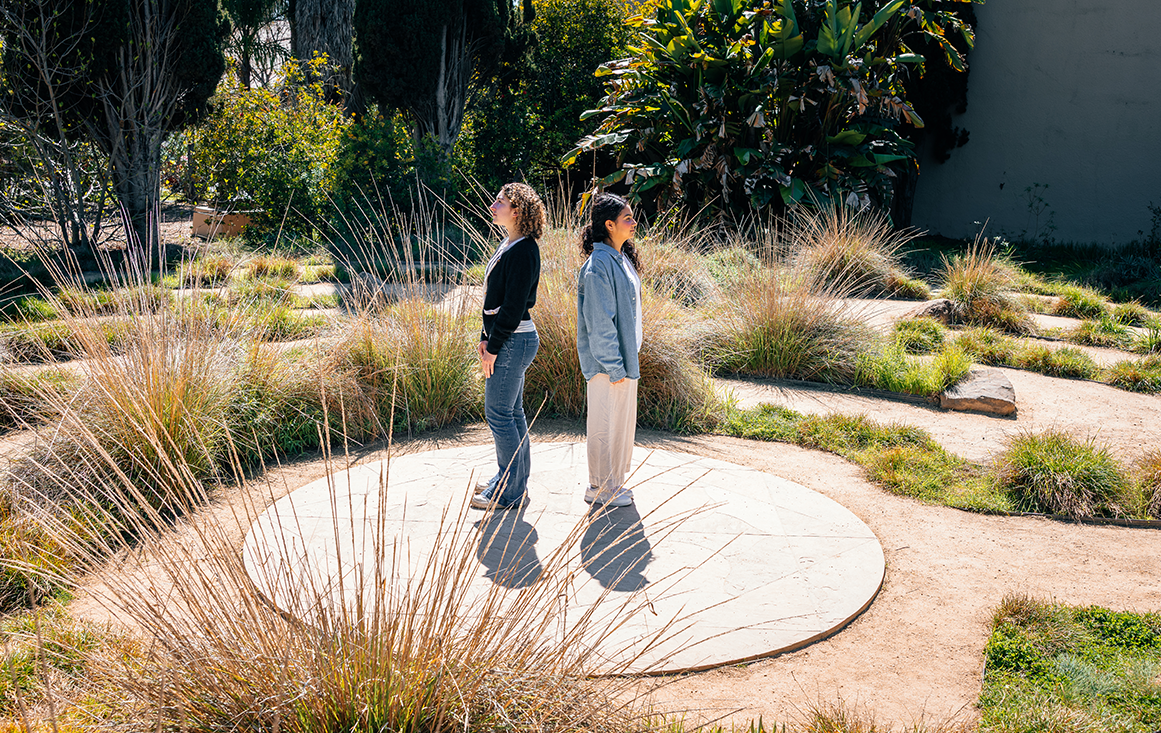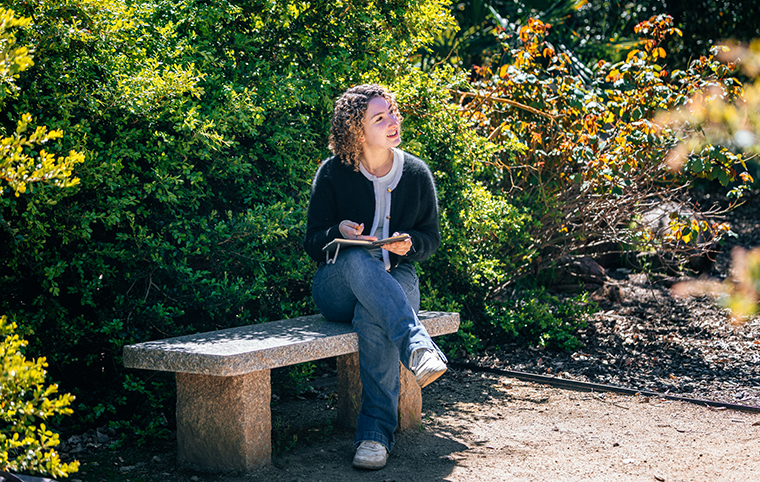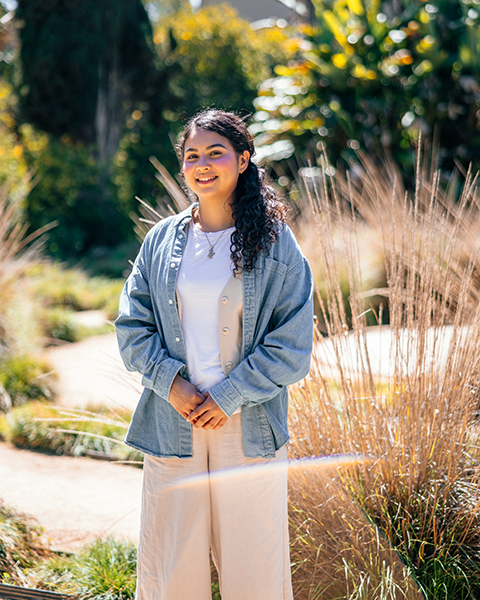Challenging Career Anxiety—Holistically

When Olivia Leonardis ’25 transferred to Santa Clara University, she had seemingly found a balance between her dual love of words and numbers—deciding to major in civil engineering and minor in journalism.
However, her first civil engineering internship wasn’t a good fit, and in 2024, she was given an enticing opportunity to explore feature writing at a magazine.
Leonardis was still set on a career in civil engineering, but maybe more storytelling experience could offer valuable ways of seeing the world beyond the traditional path most engineers take. But, she worried, would the magazine workload be too much to manage on top of her upper-level engineering courses? What if this experience made her miss the train on a more conventional engineering opportunity?
At this crucial decision point, she heard about the Career Clarity Retreat. Hosted by the Career Center, Campus Ministry, and Counseling and Psychology Services (CAPS), the two-day overnight program offered holistic career support, including mental health and vocational guidance. For Leonardis, participating was a no-brainer.
She was joined by 19 other Broncos across all years and majors, each with their own reasons for coming—some struggling with feeling directionless, others fighting burnout. From mindfulness exercises and career assessments to alumni panels and group reflections, the attendees were offered a wide array of tools to help them through any career roadblock.
Among the many retreat activities, taking the VIA Character Strengths Survey provided Leonardis with the best guidance for her specific career dilemma. The personality assessment presented students with their top five strengths out of a possible 24. This isn’t designed to limit students to this small set of skills—instead, it frames these strengths as resources.
As Career Center assistant director Myriam Bartz explained, students could lean on their top strengths as a north star to find a career where they could excel, or they could even use those strengths to access skills that felt more out of reach, like someone using a strength in curiosity to overcome a fear of talking to people.
“One of the biggest points of anxiety for me heading into the retreat was searching for what was right or what was destined for me,” Leonardis reflects. “But [Bartz] took that statement and flipped it on its side and said, ‘Well, what about reflecting on the things you already have, the things that are inherent to you and make you who you are.’ That gave me a sense of comfort, knowing that no matter what I’m doing, as long as I’m exercising those strengths, it’s going to point me in the right direction.”

“At the Career Clarity Retreat, I learned the importance of not thinking in absolutes and making decisions based in fear,” says Leonardis.
A modern approach to career anxiety
According to Vania Tong, an associate director at SCU’s Career Center, students today face a myriad of career challenges, both familiar—like time management and networking—and others that have grown in importance in recent years—like having to pivot careers in a changing job market or an emphasis on finding a greater purpose in your work.
Inspired by previous career retreats co-hosted by Campus Ministry, Tong launched the new Career Clarity Retreat in 2024 to address three of the biggest career challenges facing Santa Clara students today.
The first is what Bich Nguyen-Hamilton, a therapist at SCU’s Counseling and Psychology Services (CAPS), calls a “great existential anxiety.” This stress can be created by internalized messages in our culture that students have to know what they’re supposed to do and—somehow—ensure that it is a straight path from point A to point B to point C.
“And this demand for certainty and predictability—it’s paralyzing,” says Nguyen-Hamilton. “It’s like a baseball player getting ready for the pitch, but while they’re doing that, they’re also hitting themselves with the bat.”
The second challenge is emphasizing to students that finding one’s calling—or vocation—is about so much more than just a job. A vocation is tied to our core values and who we are as people—and it requires some level of spiritual discernment.
“I frame this to students as asking: ‘How can we be more readily open and reachable by experiences and people so that they transform us in a way that affects our desires and our actions?’” says campus minister Victor Lemus.
The third is making sure students have the tools and systems to get to know their strengths, values, and how they’re wired as people, like Leonardis’ experience taking the VIA Strengths Assessment.
Putting these three puzzle pieces together, Tong’s hope for the Career Clarity Retreat was to help students fully explore their potential and think about their careers in a more holistic way. And with additional team-building activities and the serene setting in Menlo Park, Tong wanted the retreat to demonstrate the importance of rest and reflection within career readiness, which isn’t always modeled well in Silicon Valley’s highly competitive and hyper-productive culture.

“The retreat activities helped me open up to new friendships and connections, and while it was vulnerable, I didn’t feel alone,” recalls Kassy Madrigal ’26
Slowing down and taking chances
This break from a packed, high-achieving schedule was just what Kassy Madrigal ’26 was looking for. Participating in this year’s Career Clarity Retreat meant taking a few days away from planning her sister’s quince, but it was a bit of self-care she knew she had to do for herself.
“As a first-gen student, there’s a lot of worry and anxiety on how you’re actually going to get to the finish line,” she says. “And being in my first year here as a transfer student, I wanted to meet more students who felt like me and get in a better mindset for winter quarter.”
Not only did she find the community and relaxation she was looking for, but the retreat also empowered Madrigal to take ownership of more campus resources. Because she was so new to Santa Clara, she was hesitant to go to the Career Center.
“But after meeting the staff at the retreat, it gave me another door to open where I felt welcome,” Madrigal says. “Now, I can go there confidently for help on my resume and interviews.”
Leonardis is also still reaping the benefits of attending last year’s retreat, including a new way to combat anxiety.
“I don’t do it every night, but whenever I can, I write three things I’m grateful for in the journal I got at last year’s retreat. Even if it’s a breakfast burrito that pops into my head, it’s really hard to be anxious in that moment of reflection.”
She’s also been using these lessons in challenging anxiety to take bolder steps in her career journey.
Leonardis did end up taking that feature writing opportunity last year and had a great experience despite her earlier fears about being overwhelmed with work. She continued to pursue non-traditional opportunities to expand her perspectives through a summer study abroad program in the UK. Now, she’s excitedly planning to pursue a civil engineering graduate degree in London, making the leap to more cutting-edge, data-driven water resource management instead of the safer option of looking for industry work in the U.S.
Not only does the subject area appeal to her analytical strengths, but it also aligns with her humanitarian and climate justice values.
“The Career Clarity Retreat gave me the tools to reflect and look inward and make that decision based on my sense of purpose rather than fear or external influences. I feel fortunate that I got to be in a space where I got to learn a little bit more about myself, but also realize that what I needed to make those decisions was already in me.”
Santa Clara's Career Center is an award-winning, nationally recognized office that supports the professional development and career aspirations of all undergraduate students, non-business and non-law graduate students, and alumni.


